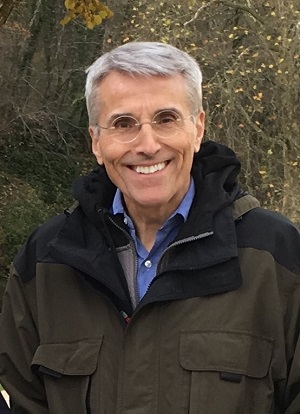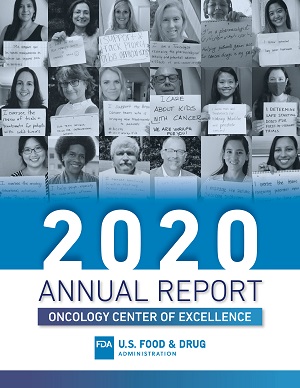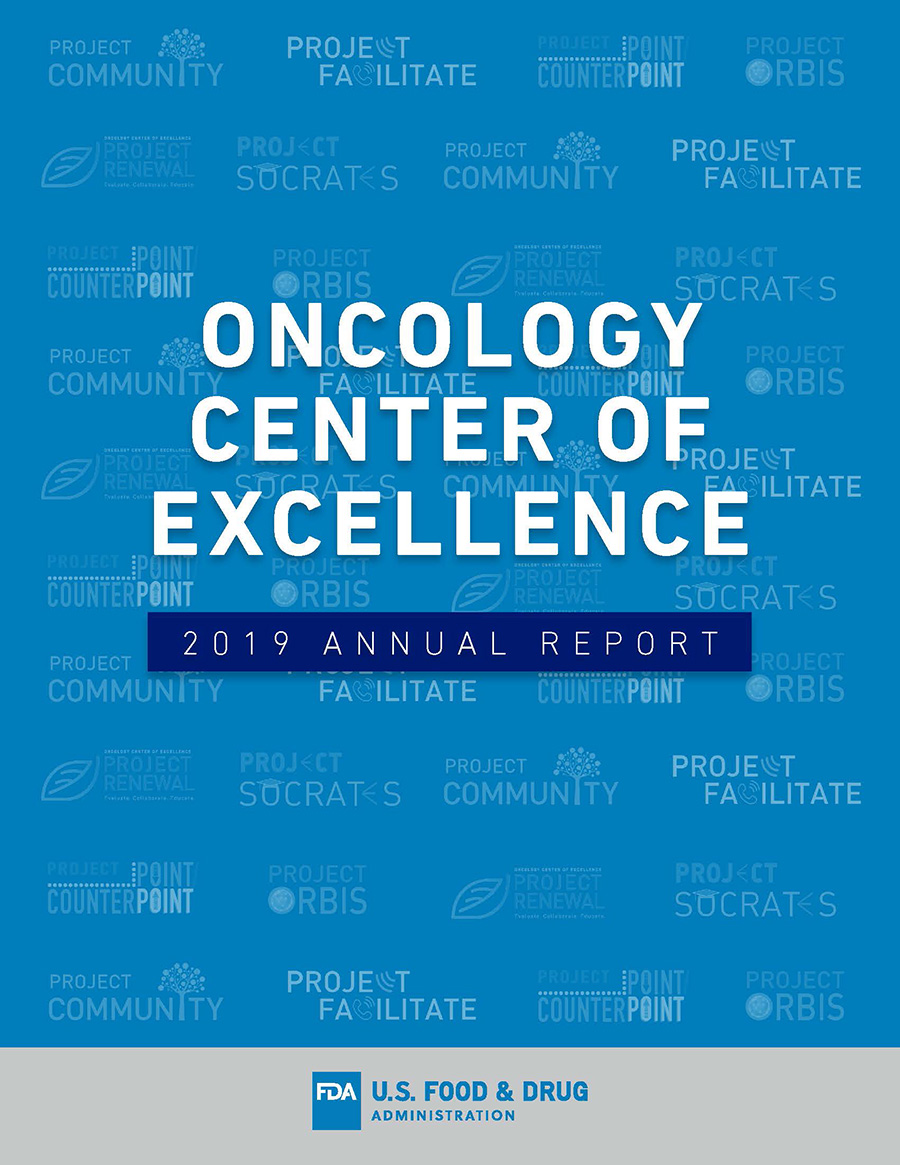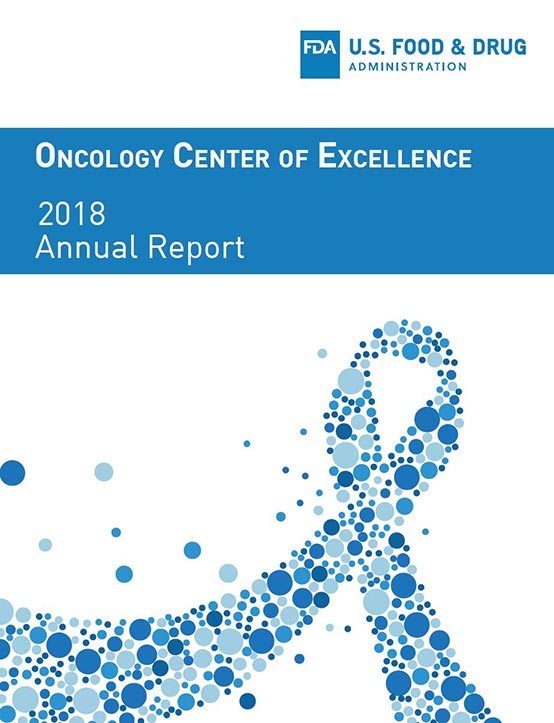2020 OCE Annual Report
Director's Message
We Have Not Forgotten Patients With Cancer During the COVID-19 Pandemic
Director, Oncology Center of Excellence
January 2021—As the Oncology Center for Excellence (OCE) marked its third anniversary one year ago, in January 2020, the COVID-19 pandemic began, causing world-wide upheaval in our society and the medical community. Since then, the FDA has focused tremendous effort on addressing the COVID-19 population, and rightly so. Here at the OCE, our attention has been devoted to patients with cancer to make sure they were not forgotten during this pandemic.
Our work has continued without interruption and with renewed energy to face the challenges of patients with cancer during this period of upheaval. The OCE participated in writing a guidance emphasizing the flexibility the FDA would exercise with regard to conduct of clinical trials with decentralized trial procedures aimed at patient safety. Patients often cannot go back to major cancer centers, and some of the testing and doctor visits can be conducted in communities nearer to patients’ homes, so the guidance allows for that. The OCE went on to issue over a dozen guidances in 2020 on many aspects of oncology drug development.
As our staff shifted to working from home in mid-March, the work never stopped from a regulatory standpoint. Overall in 2020, there were a total of 40 new indications and 19 new molecular entities (NMEs) that were approved for oncology indications. Many approvals were aimed at reducing the interaction of patients with the health care provider to limit potential COVID exposure. These included subcutaneous dosing formulations, increasing dosing intervals, and oral formulations of already approved drugs.
Several novel drugs were approved for the treatment of mesothelioma, RET-fusion positive lung cancer, refractory myeloma, initial treatment of MSI-high colon cancer, and refractory GI stromal tumors to name a few. The OCE also worked with other divisions outside of oncology to “re-purpose” oncology drugs for potential use to combat COVID-19 infections and their sequela.
Although in-person workshops were cancelled, the OCE shifted to online listening sessions with various stakeholders, including patient groups and professional societies. More than 11 listening sessions were held from March through end of year and the OCE heard repeatedly from patients with cancer about their feeling of being forgotten during the pandemic. We hope to continue these dialogues and deepen our interactions, so that far from feeling forgotten, patients feel their voices are heard at the OCE.
OCE at Year Four: Encouraging Diverse Voices
In the past year, the OCE began two major initiatives, Project Equity and Project Silver, which focus on increasing minority and geriatric patient enrollment in clinical trials and bringing the voice of under-represented populations to the world of drug development. These projects join previously established OCE initiatives on diversity and inclusion, including Project Community, which provides outreach, education, and connection between FDA reviewers and under-represented communities in the U.S., and the OCE Summer Scholars Program, which provides a summer learning experience for high school students from groups under-represented in science and medicine.
The OCE also launched Project Patient Voice, an initiative to incorporate symptomatic side effect assessment by the patient- rather than the medical professional- to inform the tolerability of cancer therapies. This is our attempt to communicate patient-reported outcome data from clinical trials to the medical community in a way that can assist healthcare providers in discussing the side effect profile of anti-cancer treatments with their patients.
Looking Back and Looking Forward
In 2020, four OCE projects conducted progress assessments and published their findings:
- Project Orbis, the OCE’s international program, reported 38 approvals in its first year working with Australia, Brazil, Canada, Singapore, Switzerland, and, most recently, the United Kingdom, to conduct collaborative reviews of important product applications. This project stemmed from our observation that many countries receive pharmaceutical applications months to years after their filing in the United States.
- Real-Time Oncology Review facilitates earlier submission of topline results and datasets to support an earlier start to the FDA oncology application review. This is particularly important because many of these drugs are breakthrough therapies that offer substantial improvements to patients with cancer. From February 2018 to April 2020, RTOR supported the submission and review of 20 oncology drug approvals.
- Project Renewal, a public health initiative OCE established to update the labeling information for older oncology products by creating a rigorous repeatable process to evaluate relevant scientific evidence from published literature, is underway.
- Project Facilitate, the OCE’s call center to assist oncology care providers in submitting Expanded Access requests, provided data on positive trends in decreased processing times and increased number of requests in its first year, consistent with OCE’s mission to improve efficiency of the Expanded Access Program and ensure equitable access to all oncology patients. However, since April 2020, the number of oncology Expanded Access requests have decreased likely due to the pandemic.
Looking forward, the OCE is engaging in Project 2025, an effort to envision the next five years in cancer drug development and leverage our resources and talents to improve collaboration with stakeholders to move the field forward as quickly as possible.
I hope you enjoy learning more about the OCE’s work described in this report and welcome your involvement and interest in the coming year to advance our mission.
Richard Pazdur, MD
Director, Oncology Center of Excellence
Previous OCE Annual Reports
The OCE welcomes feedback from stakeholders and the public.
Oncology Center of Excellence
U.S. Food and Drug Administration
10903 New Hampshire Avenue Building 22 Room 2216
Silver Spring, Maryland 20993
FDAOncology@fda.hhs.gov




